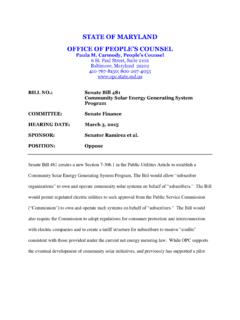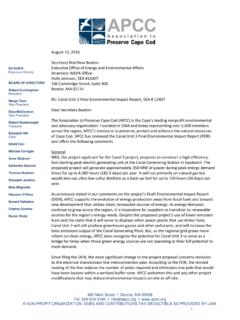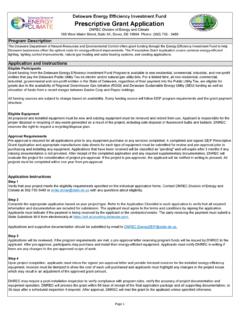Transcription of STATE OF MARYLAND OFFICE OF PEOPLE’S COUNSEL
1 STATE OF MARYLAND OFFICE OF people S COUNSEL Paula M. Carmody, people s COUNSEL 6 St. Paul Street, Suite 2102 Baltimore, MARYLAND 21202 410-767-8150; 800-207-4055 BILL NO.: Senate Bill 726 MARYLAND Clean Energy Center Clean Energy Technology Funding COMMITTEE: Finance HEARING DATE: March 8, 2016 SPONSORS: Senator Mathias et al. POSITION: Support Senate Bill 726 would amend the 2008 law establishing the MARYLAND Clean Energy Center (MCEC) in a variety of ways. Most significantly, it would expand the purposes of the MCEC and establish a Clean Energy Technology Financing Fund (Fund). The Bill also would provide for the transfer of certain funds from the MARYLAND Strategic Energy Investment (MSEIF) for specific purposes.
2 In sum, the Bill would establish a Green Bank in MARYLAND to address financing gaps for a variety of clean energy projects and technologies, and provide a funding source for a $30 million investment pool with a five year commitment for operating capital. The Fund would be administered by the MCEC, and would be subject to additional oversight. The OFFICE of people s COUNSEL (OPC or people s COUNSEL ) supports Senate Bill OPC has been an active participant in the EmPower MARYLAND proceedings before the Commission since 2008, with a focus on the development, implementation and cost-effectiveness of a diverse portfolio of residential energy efficiency These programs 1 people s COUNSEL is an ex officio member of the MCEC Advisory Council and the Strategic Energy Investment Fund Advisory Council.
3 2 OPC has participated in all of the relevant Commission work groups, and has submitted comments on the five utility(now six) proposed 3-year Plans and semi-annual reports since 2008 in Case Nos. 9153 through 9157. OPC has had the technical assistance of the Vermont Energy Investment Corporation throughout this process. OFFICE of people s COUNSEL Testimony on SB726 March 8, 2016 Page 2 of 3 currently include Appliance Rebate Programs, HVAC Rebate Programs, Home Performance with ENERGY STAR (HPwES or home retrofit) Programs, and Quick Home Energy Check-Up Programs. In addition, the Depart of Housing and Community Development administers programs for low-income EmPOWER programs throughout the STATE .
4 Participation in the HPwES program, which provides incentives for the comprehensive retrofit of houses, has been a challenge from the outset. This was acknowledged by the Commission in 2011, when it directed parties to convene a work group to analyze financing opportunities for The Commission observed that the availability of financing has been a daunting barrier to participation in many of the Companies EmPOWER programs, due to the up-front costs associated with making energy efficiency improvements and despite the availability of incentives. The Commission further noted that the lack of convenient, accessible financing at favorable rates is a missing link in these energy efficiency In the EmPOWER proceedings, OPC has continued to support the pursuit of financing options to enable residential customers to install more comprehensive energy efficiency measures in their homes and benefit from long-term cost The MCEC s MARYLAND Home Energy Loan Program (MHELP)
5 , which has provided unsecured loans to residential customers since 2011, has played a part in filling that void by providing loans to 3000 residential However, expansion of participation has been limited by the size of the program funding, and there have been barriers for low and moderate income households. An April 10, 2015 Report of the Commission s Public Utility Law Judge Division noted that most parties (including OPC) believed that the lack of a residential financing component in the EmPOWER MARYLAND have created a barrier to moderate income ratepayers to participate in EmPOWER programs such as the HPwES The Report also observed that the majority of the parties (including OPC) agreed that a financing model designed similarly to 3 PSC Case 9153-57, Order No.
6 84569, issued December 22, 2011, p. 2. 4 Id., , ftn. 4. 5 See, for example, the Commission Staff s Residential Energy Efficiency Financing Proposal, dated January 30, 2013, submitted to the Commission in the EmPower cases. 6 Green Bank Study Report and Implementation: Briefing for House Economic Matters Committee, January 20, 2016, 7 PSC Case No. 9373, In the Matter of the Investigation and Development of Innovative and Affordable Residential Energy Efficiency Financing Programs. OFFICE of people s COUNSEL Testimony on SB726 March 8, 2016 Page 3 of 3 MCEC s MHELP would be the least costly financing model to implement. Report, p.
7 1. The Report noted some concerns, including the cost of an EmPOWER financing program. Senate Bill 726 would provide a solution to this dilemma for many residential customers, and without additional funding from utility ratepayers, by providing a financing option for a variety of projects and technologies for residential and business customers. OPC s focus is on the ability of such a Green Bank to offer assistance to fill the financing gap for residential customers, and for low to moderate income customers in particular. The ability of a Green Bank, to address these concerns was highlighted in the Green Bank Study Final Report, submitted to the General Assembly on December 1, That Report also noted that additional and complementary projects, such as Solar PV, could receive funding assistance through a Green Bank.
8 Senate Bill 726 would provide the MCEC the ability to lend funds for energy efficiency and these other options. Based upon OPC s own experience with the EmPOWER MARYLAND Programs, the information provided through extensive work group discussions, and the comprehensive Green Bank Study Final Report, OPC believes that Senate Bill 726 would help to address financing gap that hinders the adoption of comprehensive energy efficiency measures in homes throughout the STATE . The transfer of unused funds from the MSEIF is a positive way to use RGGI auction proceeds, and to provide funding for a long-term and significant investment pool, which can be leveraged by the private sector.
9 For these reasons, OPC recommends a FAVORABLE Report on Senate Bill 726. 8 Report, pp. 50-52, 55-56.




